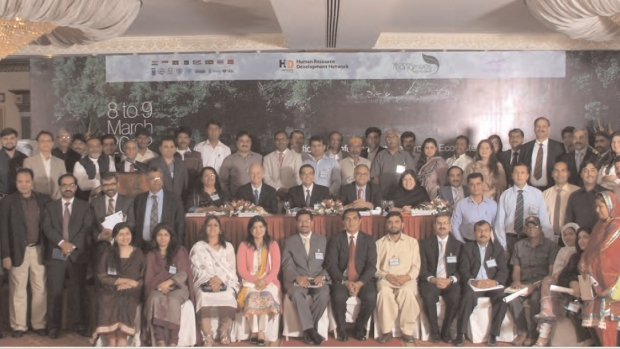Grants :: Small Grant Facilities :: Piquing Debate: Sharing experiences about mangrove ecosystems with Pakistan policy makers
Piquing Debate: Sharing experiences about mangrove ecosystems with Pakistan policy makers

Piquing Debate, Pakistan
Objectives
- Create awareness amongst policy makers on mangrove conservation.
- Provide policymakers with an understanding of the importance of mangroves and other coastal ecosystems, threats to mangrove ecosystems and impacts on livelihoods.
Background
This project was designed for policymakers in Pakistan to acquire knowledge on mangrove conservation and for them to integrate this knowledge in policy development, project planning and to formulate projects on conservation, restoration and sustainable management of mangroves. The main activity centered around holding a 2-day national conference and exposure visit to mangrove sites combined with a plantation campaign of 300 mangrove saplings to mark the International Year of Forests.
Target beneficiaries
The project beneficiaries included policy-makers, general public and the private sector.
Outputs
The project was designed to deliver the following results:
- Increased awareness among 100 key stakeholders in Pakistan about mangroves, their importance, conservation, restoration and sustainable management.
- Incorporation of environment by organizations as a cross-cutting theme.
Accomplishments and challenges
- A 'National Conference on Mangroves Ecosystems was held in Karachi on 8th March 2012. This was attended by over a hundred and fifty persons representing government departments, NGOs, and private sector. The speakers at the conference included the Regional Director IUCN Asia, the Global Vice President of IUCN, the Chairman National Disaster Management Authority, senior officials of Ministry of Climate Change, Sindh Forestry Department, and WWF Pakistan and IUCN NRM experts.
- The conference was followed by a one-day exposure visit, media debriefing and plantation campaign. Eighty persons along with the officials of Sindh Forest Department planted 300 mangrove saplings on a mud flat in Jhari creek, about 1.5 nautical miles from the Korangi Fish Harbour, Karachi.
- The conference was widely covered by almost all the major papers with an editorial published in the leading English-language daily. An interview of the Chairperson of HRDN and of Mr. Javaid Jabbar, the Vice President of IUCN Global was also aired.
Contributions to cross-cutting themes
Communications: The project has published and disseminated a report on proceedings of the ’National Conference on Mangroves Ecosystems in Pakistan. Stories related to mangroves and other coastal resources were published in various newspapers including a newspaper editorial.
Gender: The project adopted a gender mainstreaming approach by ensuring that women stakeholders participated in all the events. Approximately, fifty women participated in the national conference and exposure visit.
Climate change: The national conference in Karachi highlighted the importance and role of mangroves in mitigating the effects of coastal floods and cyclone. HRDN subsequently organized two other events, an internal forum on “Climate Change - a Point of Concern”, conducted (as part of an HRDN retreat in Cape Town in April 2012) and a talk on “Climate Change Concerns and Pakistan” organised on 8th June 2012 in Islamabad.
Lessons Learned
The national conference received more media coverage than was expected including publication of an editorial in a leading English Newspaper. Media engagement was found to be a very useful tool in highlight critical environmental issues and to draw attention of policymakers.
Project Facts
Country
Location
Karachi, Pakistan
Topic
Duration
1st Nov 2011 to 29th Feb 2012
MFF Grant Amount
PKR 860,000
Implementing Partner
Human Resource Development Network
Fauzia Malik
Executive Director
Address: Street 41, Street 56 Sector F-6/4
Email: fauziamalik@hrdn.net
Tel: + 92 51 2828259